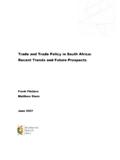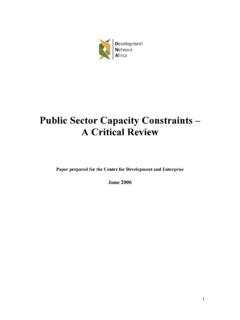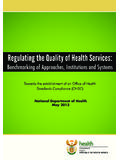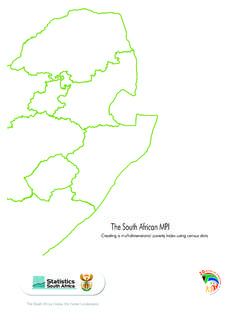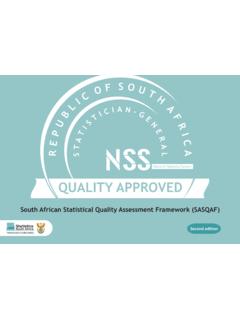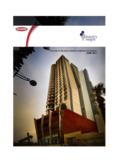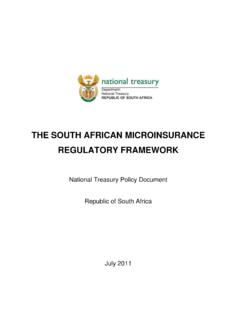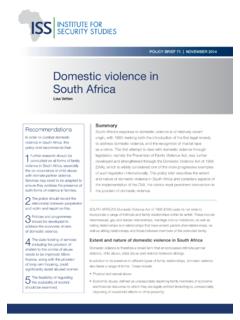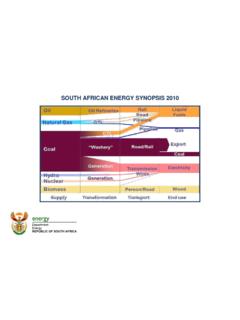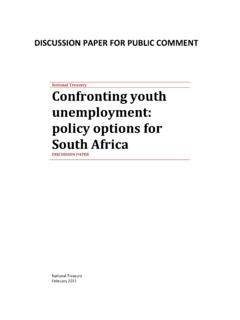Transcription of SA Professional Services - DNA Economics
1 Professional Services in south Africa Accounting, engineering and law 25 January 2009 4th Floor, south Office Tower, Hatfield Plaza, 1122 Burnett Street, Hatfield, Pretoria, 0083, south Africa PO Box 95838, Waterkloof, 0145, south Africa Tel +27 (0)12 362 0025 | Fax +27 (0)12 362 0210 | Email | Company Registration: 2001/023453/07 Directors: Gareth Ochse, Elias Masilela, Matthew Stern ACKNOWLEDGEMENTS This report and a parallel survey were commissioned by the Word Bank. We would like to express our appreciation to the staff of the Bank for the advice and assistance they have provided over the course of this study. We would also like to thank the many associations, professionals and students that provided information; and Alex Giannaros for his efforts in arranging and conducting most of the interviews. AUTHORS Niall Condon Matthew Stern Sarah Truen TABLE OF CONTENTS 1 Professional Services IN south AFRICA .. 1 Introduction.
2 1 The role of Professional Services in south Africa .. 2 2 MARKET STRUCTURE AND PERFORMANCE .. 5 Size and distribution .. 5 Fees and wages .. 6 Foreign involvement and investment .. 11 3 MARKET FOR PROFESSIONALS .. 13 The need for skills .. 13 Entry requirements .. 17 4 INTERNATIONAL COMPETITION AND TRADE .. 19 The flow of professionals .. 19 Education, registration and standards .. 19 Immigration policy and performance .. 21 The regional dimension .. 24 5 CONCLUSION AND POLICY RECOMMENDATIONS .. 26 Figure 1: Consulting engineering annual fee income (Rm 2000 prices) .. 3 Figure 2: Accounting salary comparison .. 9 Figure 3: Accounting salary comparison adjusted for cost of living .. 9 Figure 4: Lawyer salary comparison (R 000) .. 11 Figure 5: Lawyers salary comparison adjusted for cost of living .. 11 Figure 4: Number of practising Attorneys 1999- 2009 .. 16 Figure 5: Number of Attorneys by race 2007 .. 16 Figure 6: Maths graduates at secondary level in 2006.
3 17 4th Floor, south Office Tower, Hatfield Plaza, 1122 Burnett Street, Hatfield, Pretoria, 0083, south Africa PO Box 95838, Waterkloof, 0145, south Africa Tel +27 (0)12 362 0025 | Fax +27 (0)12 362 0210 | Email | Company Registration: 2001/023453/07 Directors: Gareth Ochse, Elias Masilela, Matthew Stern Table 1: Total income in accounting, engineering and law in 2006 .. 2 Table 2: ECSA Registered Engineering Professionals .. 3 Table 3: SAICA membership, October 2009 .. 4 Table 4: International comparison of chemical engineering salaries, US$ and PPP .. 7 Table 4: Hourly rates charged by legal professionals in south Africa .. 10 Table 6: Vacancies in accounting Services .. 14 Table 7: Average annual net migration, 2001-2003 .. 19 World Bank Professional Services in south Africa 1 1 Professional Services IN south AFRICA Introduction The apartheid government made substantial but racially selective investments in education, which gave rise to a class of highly qualified but largely white professionals.
4 In the postB1994 era, this has created both opportunities and challenges. On the one hand, the country is blessed with a strong base of engineers, accountants and lawyers. On the other hand, all three professions are under immense pressure to transform,1 and this has caused high levels of uncertainty and net emigration. In two of the three sectors, this has contributed to a widening skills shortage. The strength and sustainability of these professions in south Africa will largely depend on their ability to address the unique challenges that arise from south Africa s history, while simultaneously maintaining international quality standards and Professional recognition. Whereas these two objectives are not necessarily in conflict, there is some risk that a strong focus on internal transformation may contribute to increased barriers to entry for external firms and professionals (or may slow the opening of these sectors to international competition).
5 And this may limit the potential gains from increased trade and knowledgeBsharing in this sector, particularly within the SADC region. This paper reveals that such concerns are not misplaced; at least in the engineering and accounting professions. In these two sectors, it is remarkably difficult for SADC professionals to work in south Africa, largely because little or no recognition is given for past training and experience. In law, some preferences are given to some African countries, but most foreigners are required to retrain from undergraduate level in order to practice in south Africa. Not surprisingly, there is little evidence of inward migration and most of the SADC professionals interviewed indicated that it is difficult to find work in south Africa. For foreign (largely African) students training in south Africa, a new set of barriers emerge. In the legal and accounting professions, graduates must undergo two years of articles before they can qualify as an attorney or accountant.
6 Access to such positions is limited and black south African students inevitably receive preference. Similarly engineering students, particularly in the universities of technology, report difficulties in finding industrial placements for their experiential training year, with many students being unable to complete their diploma for lack of this work experience. Thus despite the apparent opportunities to train and work in south Africa, especially for wellBeducated individuals from neighboring or nearby African states, it is remarkably hard for them to enter this market. A fact confirmed by this project: we struggled to find sufficient foreign engineers, accountants and lawyers to interview. In the legal profession, where domestic supply seems to outstrip (or at least satisfy) demand, these barriers are relatively harmless. But in both the engineering and accounting professions, where south Africa faces severe skills shortages and net emigration, existing policies and restrictions are costly and in some instances unnecessary.
7 1 By 2009 , the percentage of black professionals in the accounting, engineering and legal professions remain very low, at12%, 24% and 21% respectively. World Bank Professional Services in south Africa 2 The role of Professional Services in south Africa Compared to most developing countries, south Africa has a large and well developed market for Professional Services in general, and engineering, legal and accountancy Services in particular. The actual size of these professions, in terms of numbers and contribution to GDP, is difficult to measure. Different definitions and sources give rise to very different numbers. Official data provided by Statistics south Africa, indicates that these three Services combined contribute around 2% of GDP. But this is likely to be a large underestimate of the contribution made by qualified accountants, engineers and lawyers (many of whom do not work for the specialist service firms measured by StatsSA), to the economy as a whole.
8 Table 1: Total income in accounting, engineering and law in 2006 R million % of real estate and business Services % of GDP Accounting, bookkeeping and auditing activities; tax consultancy 13,307 Engineering Services 7,201 Legal activities 11,573 All real estate and business Services 373,384 Source: Statistics south Africa, 2009 Problems with measurement are best demonstrated by the engineering profession. Looking narrowly at the consulting engineering industry, there are approximately 460 firms in south Africa, employing over 20 000 people. As shown in Figure 1 below, fee income amongst these firms has grown strongly over the past decade in line with a substantial increase in infrastructure and property investment, and in 2008, was calculated at R17 billion (just over R10 billion in real 2000 prices). Total fee income in 2006, as reported by the profession (approximately R8 billion in nominal terms), was similar to that recorded by StatsSA in the same year.
9 But the consulting engineering industry reflects a reasonably small component of a much larger industry; and many engineers are employed in large contracting and construction companies. In 2008, total construction works accounted for around of GDP, about ten times the contribution of the consulting engineering industry. This figure includes a much wider range of products and Services and it is impossible to distinguish between the engineering, project management and construction components of a particular project. In this paper, we therefore try to differentiate between consulting engineers, who are largely involved in design work, feasibility studies, engineering survey work, supervision and project management; and engineers (and engineering companies) who are directly involved in contracting and construction work. World Bank Professional Services in south Africa 3 Figure 1: Consulting engineering annual fee income (Rm 2000 prices) 02,0004,0006,0008,00010,00012,0001998199 9200020012002200320042005200620072008R million Source: CESA Similar problems emerge in accounting for the number of engineering professionals.
10 The Engineering Council of south Africa (ECSA) is a statutory body established by the Engineering Professions Act of 2000 and is charged with the accreditation and registration of all engineers in south Africa (regardless of whether they work as consulting engineers or for construction companies). By March 2009 ECSA had 30,000 registered practitioners. The Council recorded particularly large increases in registration over last few years in response to the introduction of compulsory registration and large increases in the registration of previously disadvantaged persons (with 56% of new registrations occurring over the past 3 years). Table 2: ECSA Registered Engineering Professionals Category 2004 2008-Mar 09 % growth EMF International Professional Engineers 14 19 36% Professionals Professional Engineers 14,728 14,474 B2% Professional Engineering Technologists 2,522 3,224 28% Professional Certificated Engineers 793 998 26% Professional Engineering Technicians 800 1,887 136% Candidates Candidate Engineers 3,224 4,330 34% Candidate Engineering Technologists 573 1,357 137% Candidate Certificated Engineers 107 184 72% Candidate Engineering Technicians 699 1,745 150% Specified Category World Bank Professional Services in south Africa 4 Registered Lift Inspectors 155 160 3% Registered Lifting machine inspectors 556 Dormant (since new legislation in 2001) Registered Engineering technicians 1,224 936 B24% Registered Engineering Technicians (Master) 504 441 B13% Total 25,343 30,311 20% Source.
